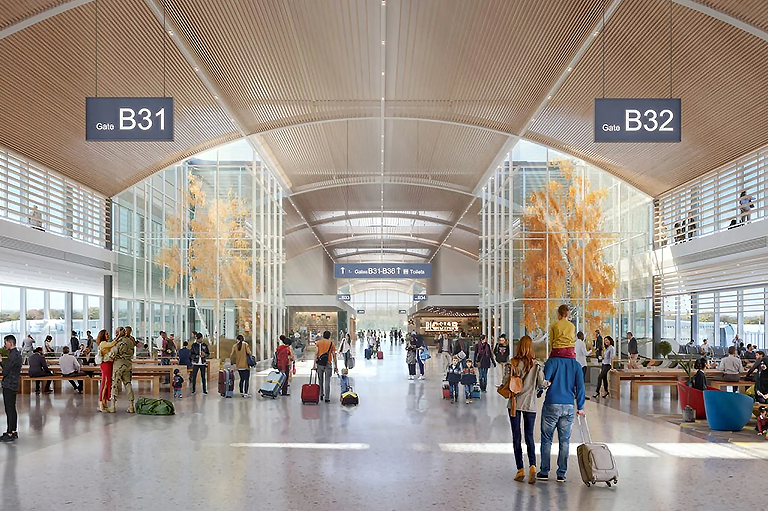Advantages of Commercial Dehumidifiers in Airports & Transportation Hubs
Airports and transportation hubs are vital in keeping the world connected, serving as gateways for millions of travelers and goods every day.
These facilities rely on advanced technology to ensure the smooth and safe operation of flights, trains, and other modes of transport. However, one often overlooked factor that can jeopardize the efficiency of these systems is excess humidity.
That said, maintaining the right humidity levels within airports and transportation hubs is crucial to protecting sensitive electronic equipment, ensuring operational efficiency, and providing a comfortable environment for passengers and staff. Commercial dehumidifiers are essential tools in managing humidity and safeguarding these critical facilities.
In this article, we’ll explore the impact of high humidity on airport electronics and highlight how commercial dehumidifiers can help protect vital systems, prolong equipment life, and enhance the overall air quality in these bustling environments.

20 DEHUMIDIFIERS + FREEBIES!
The Importance of Humidity Control in Airports and Transportation Hubs
Save ($5,880)
$16,799 $10,919
Airports and transportation hubs are equipped with sophisticated systems that are the backbone of their operations. These systems include radar, navigation, communication, and security technologies that must function flawlessly to ensure the safety and efficiency of operations.
While airports and transportation hubs are designed to handle high volumes of traffic and various environmental conditions, high humidity can pose a significant threat to their electronic systems.
Here’s how excess moisture can cause issues:
Collapsible content
1. Corrosion of Sensitive Equipment
Humidity can accelerate corrosion in sensitive electronic components. When moisture enters the internal parts of equipment like radar systems, navigation devices, and security cameras, it can lead to rust and deterioration. This corrosion weakens the integrity of the electronics, leading to malfunctions or complete failure. Just as rust can damage a vehicle, corrosion caused by humidity can render critical airport systems unreliable.
2. Signal Interference
Humidity doesn’t just affect the physical hardware; it can also interfere with the electronic signals that guide air traffic control, navigation, and communication systems. High moisture levels can cause signal degradation, resulting in inaccurate data transmission. Imagine air traffic controllers receiving faulty information due to signal interference – the consequences could be dire.
3. Short Circuits and Equipment Failures
Moisture can cause short circuits within electronic devices, leading to equipment failures. Short circuits occur when water creates a direct electrical connection between conductive components that shouldn’t be connected, leading to system shutdowns, costly repairs, and potential safety risks.
Given these potential problems, controlling humidity levels in airports and transportation hubs becomes a top priority to ensure uninterrupted operations and safety.
The Role of Commercial Dehumidifiers in Airports & Transportation Hubs
Commercial dehumidifiers are powerful tools designed to manage humidity levels in large, complex environments like airports and transportation hubs. Here’s how they make a difference:
Collapsible content

Protecting Sensitive Equipment
By maintaining optimal humidity levels, commercial dehumidifiers protect sensitive equipment from moisture-related damage. They prevent corrosion, reduce the risk of signal interference, and help avoid short circuits. This protection is essential to keeping radar, navigation, and communication systems operating efficiently and without disruption.
Extending Equipment Lifespan
Excess humidity doesn’t just cause immediate issues; it can also lead to long-term wear and tear on electronic components. By keeping moisture levels in check, dehumidifiers extend the lifespan of expensive airport equipment, reducing the need for frequent repairs or replacements. This translates to significant cost savings for airport operators.
Energy Efficiency
Many modern commercial dehumidifiers are designed with energy efficiency in mind. They provide powerful moisture removal while minimizing energy consumption, making them a cost-effective solution for large facilities. Lower energy consumption also aligns with sustainability goals, which is increasingly important for airports and transportation hubs looking to reduce their environmental impact.
Improving Air Quality
Excess humidity can lead to the growth of mold, mildew, and bacteria, which can negatively impact the air quality inside airport terminals and other facilities. Dehumidifiers help reduce moisture levels, minimizing the risk of mold growth and improving the overall air quality for passengers and employees. This creates a healthier environment, which is particularly important in high-traffic areas where people are constantly coming and going.
Enhancing Passenger Comfort
In addition to protecting equipment, dehumidifiers help create a more comfortable environment for passengers and staff by controlling humidity levels. Excess moisture can make indoor spaces feel stuffy and uncomfortable, leading to complaints and dissatisfaction among travelers. Dehumidifiers help maintain a pleasant indoor climate, enhancing the overall airport experience.
Buying Guide
Choosing the right dehumidifier for an airport or transportation hub involves considering the size and specific needs of the facility. Here are key factors to consider when selecting a commercial dehumidifier:
1. Assess Your Space: Evaluate the size of the area you need to dehumidify and its current humidity levels.
2. Choose the Right Capacity: Select a dehumidifier with the capacity suited to your space requirements for effective moisture control.
3. Energy Efficiency: Opt for models that offer energy-efficient performance to save on long-term operational costs.
4. User-Friendly Controls: Look for models with easy-to-use controls for straightforward operation.
5. Maintenance: Regular upkeep is essential to extend the lifespan of your dehumidifier and ensure its continued efficiency.
Conclusion
Airports and transportation hubs are complex environments that depend on the flawless operation of sensitive electronic systems.
High humidity poses a significant risk to these systems, leading to corrosion, signal interference, and equipment failures. Argendon's commercial dehumidifiers are essential tools in maintaining the right humidity levels, protecting equipment, enhancing air quality, and ensuring passenger comfort.
By investing in the right commercial dehumidifiers, airport operators can safeguard their critical technology, reduce maintenance costs, and create a better environment for everyone who passes through their facilities.

